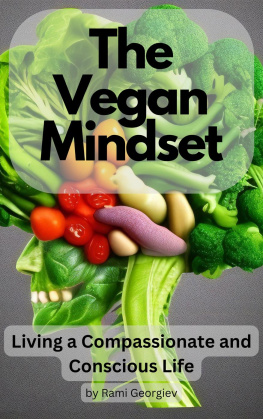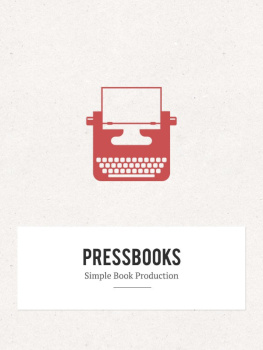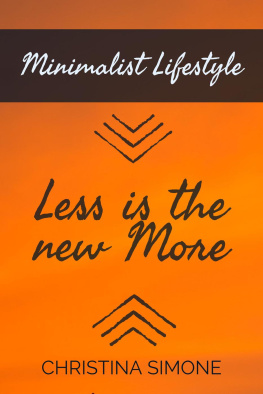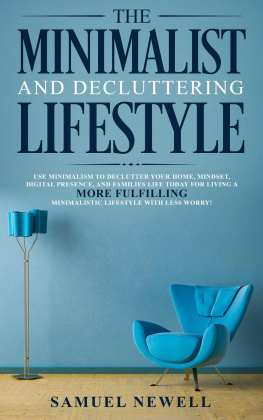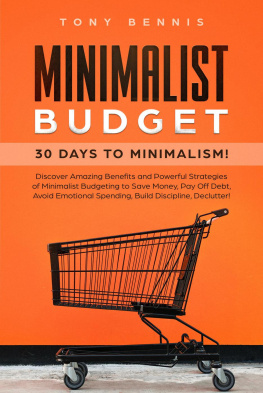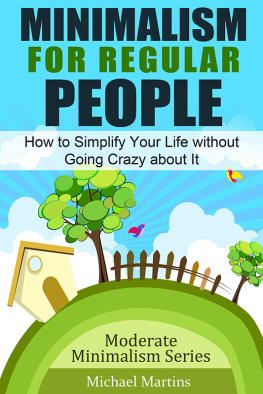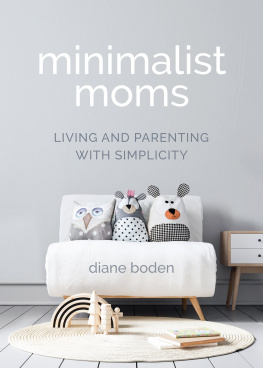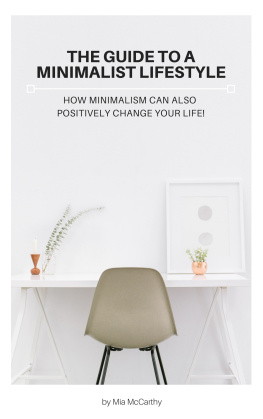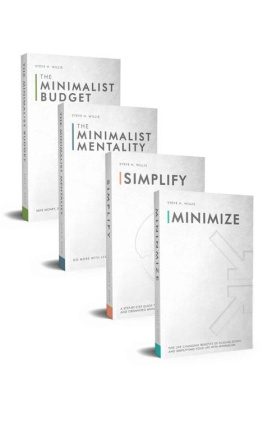The Minimalist Vegan is less of a how -to book and more of a why -to book. A manifesto on why to live with less stuff and with more compassion.
We hope that by the end of it, youll have the thirst and passion to architect your life in a way that brings you purpose and joy every day.
We respect your time and understand that you have competing interests. Thats why weve written this to be read within a few hours. Yes, even if youd consider yourself to be a slow reader!
Each chapter can be read independently, so feel free to jump ahead to a section that resonates with you. That said, reading the book from start to finish is a great way to build momentum as you manifest your ideas and dive into strengthening your values or shifting your mindset to start a fulfilling journey.
Minimalism Meets Veganism
In recent times minimalism has become a trend, even though its a concept that has been around for centuries. Its all over mainstream media, and weve seen it used across various industries including fashion, design, food, technology, beauty, housing, and more. We even named our company Minimalist Company Proprietary Limited! But when the hype-dust clears, what does minimalism actually mean?
Minimalism has traditionally been linked to pure, intentional art and design concepts. But we believe its much more than that. We define minimalism as the process of identifying what is essential in your life and eliminating the rest. Less is more.
Our modern lifestyles are far from minimalist. With so many distractions around us, we often find it difficult to create time and space to enjoy the simple things in life, like spending time with our loved ones, exercising, getting creative, cooking, or just doing nothing. Were too busy being overwhelmed by physical, digital and mental clutter that leads to increased anxiety and an overall sense of dissatisfaction. Minimalism is an antidote to that state of overload.
Were passionate about ruthlessly simplifying. However, we feel that the minimalist concept has room for improvement. In fact, it can be enhanced with the addition of vegan principles. Minimalism is, at its core, anti-consumerist, and can be a way of showcasing purchasing power, or in this case non-purchasing power. Veganism can be used in the same way. In many aspects, both ideals look toward the same goal: being conscious of exploitative and wasteful practices to protect our health, the environment, and the lives affected by unrestrained consumerism (whether human or animal).
Imagine a world where food and products are made ethically and in a way that supports our planets ecosystems. Imagine a world where we are no longer spending all our time and energy accumulating things we dont need or cant afford.
The combination of these two ideals has the power to shift the demand for what we consume dramatically. Thats why we work hard every day to live a minimalist, vegan lifestyle. Its not perfect, and we dont always get it right, but we believe its an ideal worth pursuing.
While veganism and minimalism are unique in their own right, they work together beautifully. The underlying theme that links the two concepts together is mindfulness: being mindful of what you consume, whether food or luxury goods. Its about being aware of how every decision you make impacts you and whats around you. For example, a minimalist vegan is not only selective about how many things they buy, but theyre also careful about how those things were sourced and made. Now you may be thinking, this sounds idealistic and even stressful, but when youre passionate about serving the world however you can, the effort becomes second nature.
Minimalism and veganism are perfectly complementary lifestyles that together have the power to spark positive global change. So, are you ready to embark on your minimalist vegan journey?
The More Virus
When did we become a society dedicated to wanting more all the time? More gadgets, more cars, more space, more social media, more news, more clothes, more friends, more stuff. Theres a virus in town. Something that we like to call The More Virus.
Our world has been locked into a system of free-market capitalism for decades. We live in an economic system based on constant growth. In other words, a system that relies on us to consume more. Companies produce mountains of things that we do not need, and advertising campaigns convince us that we need those items to feel happy, fulfilled, joyful, desired, and worthy. Over $170 billion is spent globally every year just on digital advertising. The More Virus has become stronger over the years as advertising budgets have increased. But you can rise above mass marketing, and live life on your own terms.
Youve probably walked past a shop before and spotted something that you just had to have. Weve all had those moments, but how often does this happen to you? Once a month? Once a week? Every day? And how have these desires impacted your life?
Why Do We Always Desire More?
Is it because we care too much about what others think of us? About their reaction when they come to our house or see us in that outfit? Are we trying to bandage insecurities about ourselves and our lives with retail therapy? Is it purely out of boredom or to fill a void? What triggers our desire for material possessions? Do we even really know?
According to Harvard Business School Professor Gerald Zaltman, 95% of our purchasing decisions are made subconsciously. We buy based on our emotions, and then use logic to justify the purchase later. For example, you might walk past a coffee machine in a department store. Your subconscious has linked that particular product to a happy family scene, thanks to a television advert. On a subconscious level, youre craving the connection of a relationship, and that emotion is what will drive you to buy the item. , Not the need to make your barista-style coffee every morning. You dont really need it, but you then justify it to yourself: It looks great in the kitchen; I needed something to complement the food processor; I can finally host those dinner parties and impress my friends; I can save on take-out coffees; It wasnt that expensive after all.
Every day we are subjected to hundreds, if not thousands, of messages specifically designed to connect a positive emotional response to a product, with the aim of making you buy it. Bus stops, train platforms, television, the internet, magazines, newspapers, flyers, billboards, your phone, apps, your laptop, or your tablet. Everywhere you look, there are advertsmany of them now targeted to your interests, based on what you search for online, even based on the conversations you have on social media. And these adverts encourage us to buy more by promising us that more stuff equals more happiness: And that is a lie.


